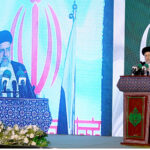UNITED NATIONS, June 03 (APP): The Geneva-based office of United Nations High Commissioner for Human Rights (OHCHR) has made public a letter from five UN experts to the Indian government expressing grave concern over the arbitrary detention, enforced disappearance, torture and ill-treatment committed by Indian forces against Kashmiri activists, especially Waheed Para, Irfan Ahmad Dar and Naseer Ahmad Wani.
The joint letter was sent the Government of India by the experts on torture, arbitrary detention, enforced disappearance, extrajudicial killing; and counter-terrorism to India on March 31, 2021. But New Delhi did not respond to their letter.
Para, a member of the Jammu and Kashmir People’s Democratic Party, which administered Jammu and Kashmir in an alliance with the Hindu Bharatiya Janata Party (BJP) until 2018, has been under detention since Nov. 25, 2020.
The UN experts said Para was subjected to harsh treatment at the National Investigation Agency (NIA) headquarters in New Delhi. He was targeted for speaking out about the government and subjected to abusive interrogations after his arrest which lasted from 10 to 12 hours at a time.
“He was held in a dark underground cell at subzero temperatures, was deprived of sleep, kicked, slapped, beaten with rods, stripped naked and hung upside down. His ill-treatment was recorded. Para was examined by a government doctor three times since his arrest last November and three times by a psychiatrist. He requested medication for insomnia and anxiety,” the experts’ letter said.
Also highlighted in the letter was the case of Irfan Ahmad Dar, a 23-year-old shopkeeper who was arrested on Sept. 15, 2020 near his residence in the Sopore area of northern Kashmir by the Jammu and Kashmir police’s Special Operations Group (SOG).
The next morning, Dar’s family received news of his death. They had found his facial bones had been fractured, his front teeth were broken and his head appeared to have bruises from blunt force trauma. His family was allowed to see his body for about 10 minutes before burial, the letter said.
In response to protests against the killing, the district administration ordered a probe. During the probe, two police officers were suspended for “negligence of duty” for allowing him to escape, but nobody was held accountable for his killing, the letter added.
To highlight enforced disappearances, the experts mentioned the case of Naseer Ahmad Wani, a resident of the southern Shopian district. On Nov. 29, 2019, Indian soldiers raided his home and locked all his family members inside a room while beating him up for more than half an hour in another room.
The soldiers took him along. When his family visited the army camp in Shadimarg, they were turned away. The same evening, some army officers visited the Wanis and told them they had released him, the letter said. He remains untraced to date.
“While we do not wish to prejudge the accuracy of these allegations, we are expressing our grave concern that, should they be confirmed, they would constitute arbitrary arrests and detention, torture and ill-treatment, enforced disappearance and, in the case of Dar, extrajudicial killing, and would amount to violations of Article 6 [of the International Covenant on Civil and Political Rights],” the letter said, referring to the right to life and not to be arbitrarily deprived of life.
The Indian government has not replied to the letter or five other communications by several other rapporteurs since Aug.5, 2019, when it scrapped the autonomy of the region and introduced laws to undermine the Muslim-majority population, raising fears of a demographic invasion.
The experts reminded the Indian government that concerns about the “deteriorating human rights situation in Jammu and Kashmir, including alleged ongoing violations of India’s minorities, particularly Kashmiri Muslims,” have been raised in five earlier communications by several special rapporteurs since August 2019.
In July 2019, the UN High Commissioner for Human Rights (OHCHR) released a 43-page report recommending the formation of a commission of inquiry to conduct a “comprehensive, independent, international investigation” into allegations of human rights violations in Kashmir.
A commission of inquiry is one of the UN’s highest-level probes, generally reserved for important global crises. The Indian government rejected the allegations of rights violations.
The five experts are: Nils Melzer, Special Rapporteur on torture and other cruel, inhuman or degrading treatment or punishment; Elina Steinerte, Vice-Chair of the Working Group on Arbitrary Detention; Tae-Ung Baik, Chair-Rapporteur of the Working Group on Enforced or Involuntary Disappearances; Agnes Callamard, Special Rapporteur on extrajudicial, summary or arbitrary executions, and Fionnuala Ní Aoláin, Special Rapporteur on the promotion and protection of human rights and fundamental freedoms while countering terrorism.





